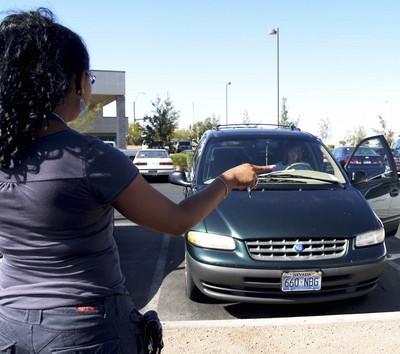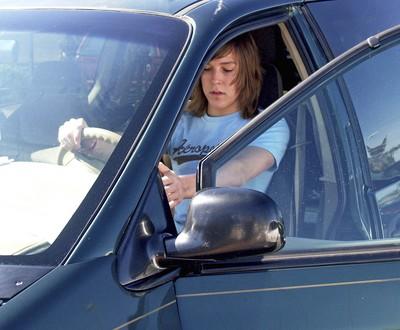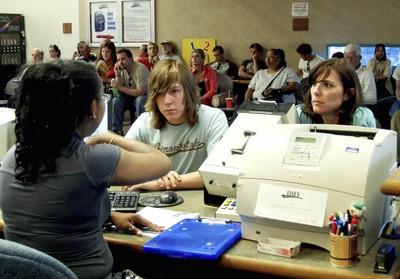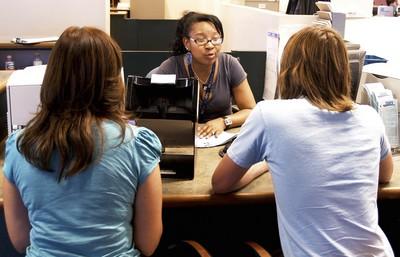Behind the Wheel
If you know a teenager who just got a driver's license, chances are he or she will be in an accident before leaving high school.
"I've barely been driving for a year, and I've already gotten in two accidents," says Justin Galli of Bishop Gorman High School. "Together, there was over $17,000 worth of damage. I think my insurance company is ready to blacklist me. I'm not the only one, though. At least 10 of my friends have gotten in accidents this year, too."
On Oct. 1, 2005, a new state law went into effect, requiring teens to gain more driving experience before they can take to the road on their own.
Beginning drivers cannot apply for a permit until they turn 15 1/2, and they must have this permit for at least six months before they can apply for a license and take the driving test.
Before taking the test, teenagers need to have proof that they have completed 30 hours of professional driving instruction. Teens also need to have a detailed driving log that proves they've driven at least 50 hours, including 10 during the night, with a licensed driver at least 21 years old.
Once teens get their license, they must wait three months before they can drive their friends around without an adult in the car, although they can drive younger immediate family members. Finally, the curfew for new drivers runs from 10 p.m. to 5 a.m. until they turn 18, unless they're driving to or from work or a scheduled school event.
According to statistics from the UNLV Safe Community Partnership, the new law is having an effect. In 2002, three years before the law was approved, 18 teenage drivers were killed in Nevada, along with 21 teenage passengers.
In 2006, only one year after the tougher licensing standards became law, 16 teenage drivers died in Nevada accidents, along with 12 teenage passengers. So only 28 teenagers were killed last year, compared with 39 in 2002, in accidents where a teen was driving.
Tyler Quillan, 18, a student who addressed the Nevada Legislature when the bill was introduced, says the legislation is a good start.
"A 15- or a 16-year-old is really not experienced enough to be driving a car in this busy city," says Quillan, who attends Bishop Gorman. "There needs to be even more restrictions placed on new drivers."
State Sen. Barbara Cegavske, R-Las Vegas, and nine other senators want to extend the three-month period during which newly licensed teens are prohibited from having their friends as passengers. Under Senate Bill 293, teens would have to have their licenses for six months before they could drive anyone other than immediate family. It also would make parents pay a fine if the teen driver is caught violating the provisions of the graduated license. The 2007 Legislature hasn't voted on the proposal yet.
Quillan says it is up to parents to help their teens become better drivers. They need to take their kids out driving for longer than the 50 hours required, get professional driving instructors, and teach them to drive under all sorts of conditions, he says.
Erin Breen, director of the UNLV Safe Community Partnership, agrees with Quillan. She is an avid supporter of the Graduated Driving Law, or GDL, as it is known in the business. "Parents are still the No. 1 tool we have for saving teen lives, but this (the GDL) is a great help," she says.
Breen also stresses the use of seat belts. According to Breen, teenagers wear seat belts less often than any other age bracket, and this is one of the reasons the fatality rate is so high for teens.
Asked what they think about making it harder for teenagers to get a driver's license, many teens say they favor the idea. They agree that if they had been required to practice more with their parents, they probably would be better drivers.
"It all comes down to experience," says Brittany Highland, 17, who attends Bishop Gorman.
"My parents still haven't allowed me to get my license, and I've been driving with them for over a year and a half. Since I've waited so long, however, I feel like I am more prepared to drive."
There are many things teens can do to gain experience behind the wheel. Programs like Driver's Edge, created by Jeff Payne, are dedicated to teaching teenagers how to react during emergency situations. Driver's Edge is a free half-day class that allows teens to learn driving techniques like skid control, evasive lane change, anti-lock braking, panic braking and much more from trained driving professionals.
Driver's Edge even gives out trophies to the teens who perform the best out of the group in a certain area. Alicia Hoepfner of Bishop Gorman, who won an award for skid control, says, "Driver's Edge has taught me to be a defensive driver. No one is a perfect 10 driver, but they gave me the tools to try and be a perfect driver. I learned that when it all comes down to it, it is up to teenagers to take responsibility behind the wheel."
R-Jeneration

























